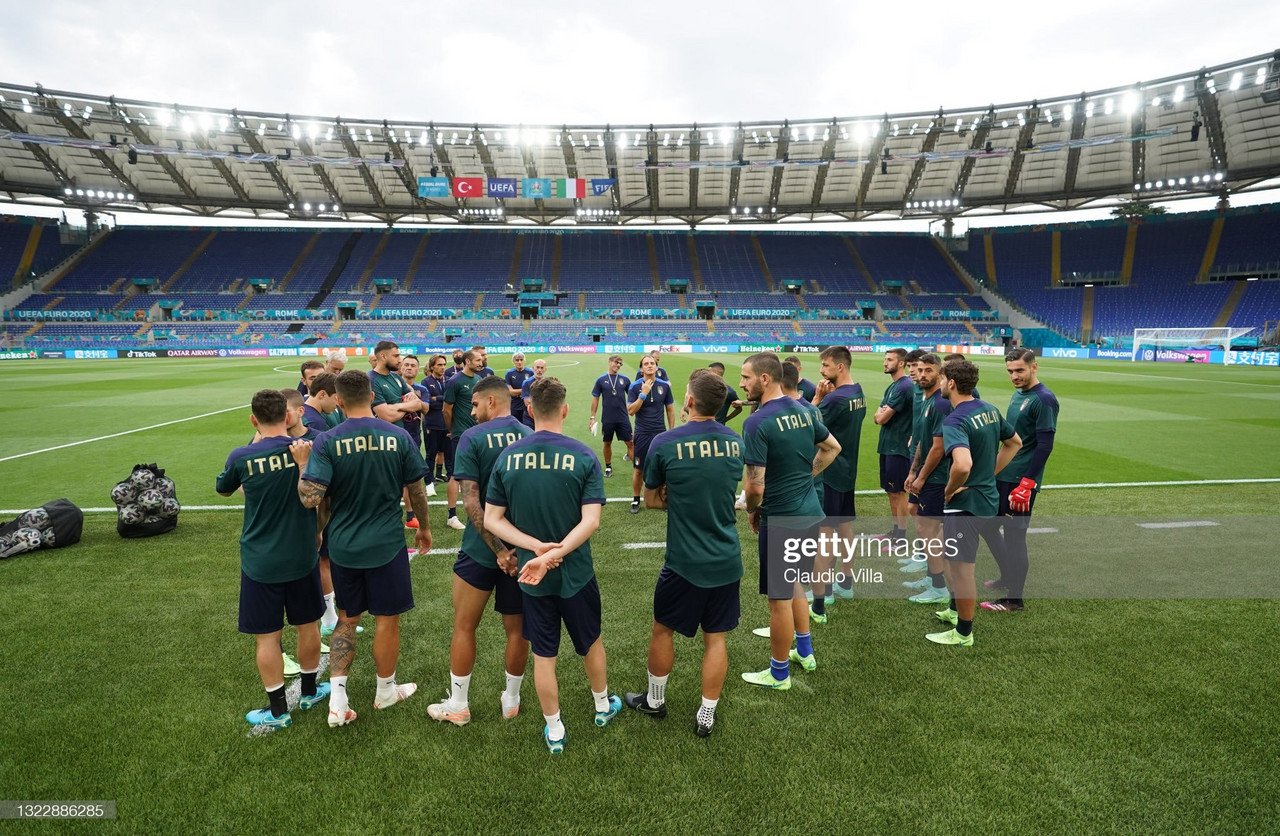A year-long delayed Euro 2020 gets underway tonight as Italy take on Turkey at Stadio Olimpico.
The Azzurri have been placed in Group A which, on paper, is one of the most intriguing and balanced groups of the tournament.
The group has a mix of league winners, promising starlets, and marquee players with points to prove after lacklustre campaigns at club level.
Roberto Mancini’s resurgent Italy are the favourites to top the group, with talent oozing from their squad. But it is going to be a tough ask with a fast-improving Turkey, a sturdy Switzerland, and an unpredictable Wales in their way.
Here is a quick insight into Italy’s opponents in Group A:
Turkey
Manager: Şenol Güneş
Possible starting XI (4-5-1): Çakır; Çelik, Demiral, Söyüncü, Meraş; Yokuşlu; Çalhanoğlu, Tufan, Ünder; Yazici; Yilmaz
Despite ranking the lowest of the four, Turkey have been tipped as a ‘dark horse’ ahead of the tournament.
They have been under the leadership of Şenol Güneş, who led his side to a third-place finish at the 2002 World Cup, since 2019 when he returned as national team coach.
The 69-year-old has helped to keep Turkey sturdy and organised in defence whilst remaining fluid going forward. This was shown through a stellar qualifying campaign, winning seven of their 10 qualifiers, which included taking four points from world champions, France.
Turkey’s strength is their defence, with the likes of Zeki Çelik, Çağlar Söyüncü, Kaan Ayhan, Merih Demiral, and Ozan Kabak amongst their selection. Their backline helped The Crescent-Stars to eight clean sheets in qualifying, conceding just three goals over that 10-game route.
They are also blessed in the forward line, with a resurgent Burak Yilmaz coming off an excellent campaign with Ligue 1 champions Lille, as well as creative midfielder Hakan Çalhanoğlu, who ranks second in most chances created from Europe’s top five leagues with 53.
However, a potential weakness to this promising outfit is in the goalkeeping department as Trabzonspor captain Uğurcan Çakır has only made a handful of caps for his national side. But, to his credit, has impressed over the last couple of seasons which has seen the 26-year-old linked with moves to Inter Milan and Borussia Dortmund.
One to watch: Zeki Çelik
Çelik has enjoyed a title-winning campaign with Lille and is part of a Turkish trio who starred for the Ligue 1 club.
Joining from İstanbulspor in 2018, Çelik immediately forced his way into the Lille side with 13 goal involvements in 84 league appearances. He isn’t the most prolific of wing-backs in the division, but Lille was not renowned for being the most offensive side in France’s top-flight either, and it was their defensive discipline that saw them prevail. Çelik has averaged 2.7 tackles per game, 2.3 blocks per 90, and has helped with his side’s pressing game with 5.2 successful pressures per match.
Overall, Çelik might not seem the most exciting for his club or country, however, he is certainly one to look out for in a cohesive unit, and a strong showing at the tournament could make the 24-year-old a wanted man in the summer.
Switzerland
Manager: Vladimir Petković
Possible starting XI (3-4-1-2): Sommer; Elvedi, Akanji, Schar; Mbabu, Xhaka, Freuler, Rodriguez; Shaqiri; Gavranovic, Seferovic
Switzerland will be hoping to get out of the group stage for just the second time in the past five tournaments, having been eliminated in the round of 16 by Poland at Euro 2016. They will be confident in doing so coming into this summer, having won each of their last six matches.
Momentum is an important factor at a major tournament and, if they can secure a victory against Wales on Saturday, this could propel them forward in the competition and potentially see them reach their best-ever finish.
La Nati have a balanced squad and are a side known for grinding out results. They managed to top a difficult qualifying group without arguably their star man, Xherdan Shaqiri, who missed most of the campaign with an injury. However, looking beyond their starting XI, they do not have much strength and quality in depth.
One to watch: Granit Xhaka
Granit Xhaka is a name that has divided opinion amongst those at Arsenal, but it is hard to argue against his importance on the national front.
Xhaka is a strong, tough-tackling defensive midfielder who has thrived in that pivot role alongside Atalanta’s Remo Freuler in the Swiss centre. His stability and strength in the middle helps hold the side together, as well as helping guide the Rossocrociati’s young players in the squad.
With a move to Roma in the pipeline, the Swiss captain could use this tournament to build momentum ready for a fresh start in Italy.
Wales
Manager: Rob Page
Possible starting XI (3-4-3): Ward; Rondon, Mepham, Davies; Roberts, Allen, Ramsey, Norrington-Davies; Brooks, Moore, Bale
Wales will be hoping to rekindle the magic of their previous European Championships. Under the guidance of Chris Coleman, The Dragons were the surprise package of Euro 2016, as they topped their group before beating Northern Ireland in the round of 16. They then shook Belgium’s ‘golden generation’ with a 3-1 victory before being knocked out at the semi-final stage by eventual winners Portugal.
Just eight players remain from that magical summer for Wales, but they have reasons to be optimistic with the bright, promising crop of talent that they have selected. A weakness, however, is that a large chunk of that squad is inexperienced at both club and country level. Another dent in their preparations is the dismissal of Ryan Giggs, who was replaced by assistant Robert Page due to an impending court case.
Wales play with good intensity and can retain the ball well, with more of an emphasis on counterattacking as they break at pace. However, at times against Albania, they panicked under a high press, making unforced errors and putting themselves under unnecessary pressure.
One to watch: Kieffer Moore
Kieffer Moore comes into Euro 2020 off the back of an impressive campaign, where he netted 20 goals in 41 Championship games for Cardiff City.
Moore is a robust centre forward, who is dominant in the air. He is a player who Wales can utilise in their 3-4-3 to bring forwards Gareth Bale and David Brooks into play.
In their two friendlies ahead of the tournament, Page opted to use Harry Wilson and Aaron Ramsey in that ‘centre forward’ role against France and Albania, respectively. However, neither were able to influence a presence as that focal point as much as Moore did in his two cameo appearances of the bench, which may have seen him play his way into the starting line-up for The Dragons.
Wales will come up against some strong centre-backs in their group games, so someone like Moore would help to throw a spanner in the works to dismantle the backlines of their opponents.










































